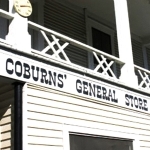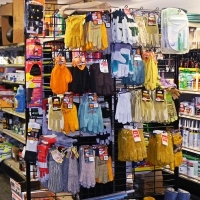 "That will be two dollars and ten cents… out of five."
"That will be two dollars and ten cents… out of five."
(HOST) To conclude our
encore presentation of last summer’s
joint project with the Billings Farm and Museum on Vermont’s General Stores, commentator Tom Slayton looks at
their survival – and their relevance – in
today’s Vermont.
(SLAYTON) Most of
Vermont’s general stores take quiet pleasure in being a little
old-fashioned. But are they anachronisms, out of touch with today’s
fast-paced and fast-changing world? It’s a fair question, especially in
light of the undeniable fact that these stores often operate on
paper-thin profit margins, and occasionally fail as businesses.
You
could argue that this is true because the stores are no longer
necessary and can’t compete. Supermarkets sell groceries. Chain stores
sell everything from clothing to hardware. And convenience stores sell
beer, wine, cigarettes, and gas. Who needs the general store any more?
However,
don’t ask that question in Woodstock or Greensboro, or Norwich or any
other Vermont town that loves its general store. There are a lot of
those towns and they want their stores to stay open.
Although
best known for its landscape of farmed fields and Green Mountains,
Vermont – at least a lot of it – is actually a village culture. Villages
and small cities capture the essence of Vermont. They are where most
Vermonters meet and work. And they are often distinctive and unusual
expressions of Vermont’s history and, if you will, its soul.
General
stores remain an essential part of small-town Vermont. And that fact is
part of why they have survived here. Vermont – especially rural and
small-town Vermont – seems to be a good environment for these stores.
In
South Woodstock for example, the South Woodstock Country Store’s deli is busy from
early morning to late afternoon. Local people stop by for a quick
breakfast, a few words with their neighbor or the storekeeper, and they
grab a newspaper on their way out. In Tunbridge, Felchville, or South
Strafford, it’s a long drive to pick up eggs, milk, or bread, and so the
local store in each town saves its customers time and gas a few times
each week.

Everyone around
Norwich and beyond seems to love Dan & Whit’s for its wide array of
merchandise and friendly service. And the clientele of F.H.
Gillingham’s goes far beyond Woodstock. People from the entire region
shop for specialty items there, and the local schools send classes of
youngsters over to hear about the store’s long and colorful history – a
history that is still unfolding.
Perhaps
these stores are thriving simply because people want them to thrive.
They are a part of what makes each village distinctive, after all. And
Vermonters have long treasured their state’s distinctiveness.
How
have these stores stayed viable despite the changes wrought by
technology, the automobile, the highly competitive retail environment,
and the passage of time? Well, the short answer is, they have changed
with the times. Instead of bins of flour and soda crackers, they now
sell fishing worms, fine wine – and work gloves. They now draw
customers in with cold drinks and a good deli instead of checkers around
the wood stove on a wintry night.
And the best of them still are, as one store owner has described them, "the beating heart of their community."